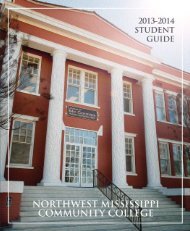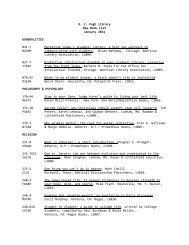Coping with Seven Disruptive Personality Types in the Classroom
Coping with Seven Disruptive Personality Types in the Classroom
Coping with Seven Disruptive Personality Types in the Classroom
You also want an ePaper? Increase the reach of your titles
YUMPU automatically turns print PDFs into web optimized ePapers that Google loves.
For example, one ra<strong>the</strong>r young, unmarried, and childless psychology <strong>in</strong>structor at aMidwestern college once compla<strong>in</strong>ed about how some of her older students who wereparents would blister her <strong>with</strong> compla<strong>in</strong>ts that she did not know enough about <strong>the</strong>psychology of children because she didn’t have any. A pert<strong>in</strong>ent question here is how <strong>the</strong>yeven knew that she had no children. In this particular case, she had shared this personal<strong>in</strong>formation <strong>with</strong> <strong>the</strong>m when <strong>the</strong>y pressured her to disclose it. Clearly, <strong>the</strong>re was no reasonfor her to share this <strong>in</strong>formation <strong>with</strong> her students, and <strong>the</strong>y were cross<strong>in</strong>g personalboundaries by pressur<strong>in</strong>g her to disclose it. Had she rema<strong>in</strong>ed firm and tight-lipped abou<strong>the</strong>r personal life, she might have averted this particular form of attempted denigration anddevaluation.This struggl<strong>in</strong>g <strong>in</strong>structor merely needed to be rem<strong>in</strong>ded that <strong>the</strong>re are many people <strong>with</strong>children who have poorly understood and atrociously raised <strong>the</strong>m. Conversely, <strong>the</strong>re aremany people who do not have <strong>the</strong>ir own children but who, like she does, understand <strong>the</strong>psychology of children exceptionally well.In o<strong>the</strong>r words, hav<strong>in</strong>g children does not necessarily qualify a person to teach childpsychology, and not hav<strong>in</strong>g children is not a disqualify<strong>in</strong>g factor for this assignment.Students who attempt to devalue and demean <strong>in</strong>structors <strong>in</strong> this fraudulent manner shouldsimply be told that <strong>the</strong> college deems its <strong>in</strong>structors acceptable based entirely on <strong>the</strong>irprofessional qualifications, and <strong>the</strong>y will endeavor to fulfill <strong>the</strong> requirements of that positionto <strong>the</strong> best of <strong>the</strong>ir abilities. If students are not satisfied <strong>with</strong> that explanation, <strong>the</strong>y are freeto consult an adm<strong>in</strong>istrator about <strong>the</strong>ir concerns.How to RespondThis type of student can be very hard on an <strong>in</strong>structor’s confidence and sense of self-worth.When confronted <strong>with</strong> a student who challenges your worth, rem<strong>in</strong>d yourself that you werehired to do your job based upon <strong>the</strong> strength of your qualifications.• Remember: College hired you based on your qualificationsKeep <strong>in</strong> m<strong>in</strong>d, for your own protection, that self-entitled students do not respect personalboundaries or privacy especially well. They may attempt to <strong>in</strong>trude on your privacy byask<strong>in</strong>g <strong>in</strong>appropriate questions. Try to refra<strong>in</strong> from answer<strong>in</strong>g personal questions asked bystudents <strong>with</strong> personal self-disclosures unless you are absolutely certa<strong>in</strong> that yourdisclosures provide an absolutely relevant and positive contribution to <strong>the</strong> topic underdiscussion.24


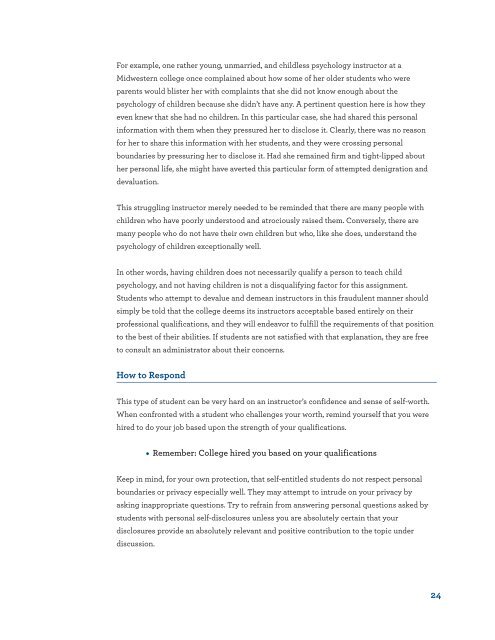

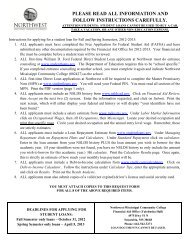
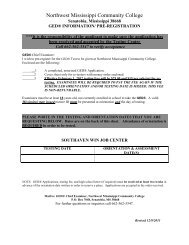


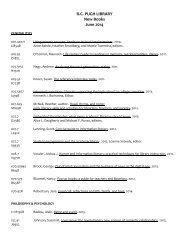


![Pro-Dental Hygiene [Major Code T34] - Northwest Mississippi ...](https://img.yumpu.com/35524032/1/190x149/pro-dental-hygiene-major-code-t34-northwest-mississippi-.jpg?quality=85)

